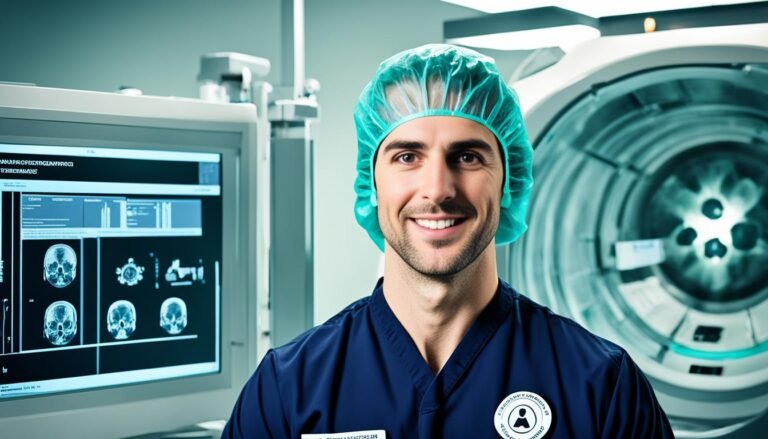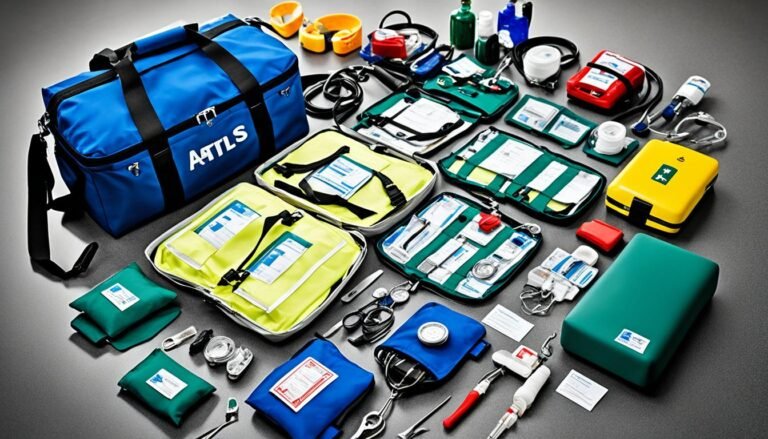A Guide to Becoming a Certified Professional Coder (CPC)
Are you aware that the job market for certified professional coders is growing fast? It’s expected to jump by 11% from 2018 to 2028. This growth is fueled by our aging population and the rise of new health tech. Getting a Certified Professional Coder (CPC) title can lead to a satisfying healthcare career.
This guide is here to show you how to get CPC certified. It covers everything from preparing for the exam to finding work. You’ll learn about coding rules, where to study, job outlook, and how much you can earn. We’ll also talk about online courses that can make your CPC journey smoother.
Key Takeaways:
- Obtaining CPC certification can lead to a promising career in medical coding.
- The demand for certified professional coders is projected to grow by 11% from 2018 to 2028.
- AAPC offers comprehensive exam preparation resources to help you succeed in the CPC exam.
- Continuing education is essential for maintaining CPC certification and staying updated with coding guidelines.
- CPC online courses provide flexibility and convenience for individuals pursuing CPC certification.
Prepare for the CPC Exam
Getting ready for the CPC exam is crucial for aspiring Certified Professional Coders. There are many ways to study based on what works best for you. If you like classes or enjoy learning online, you can pick the best CPC program for you.
Online CPC Training
Studying online for the CPC test brings ease and flexibility to learn when you can. With courses you can do at your own pace, you can fit studying into your schedule. This is great for those who are busy or like to learn on their own.
For a more guided experience, consider taking instructor-led courses online. They offer support from teachers who can help you. You can also connect with other students in online discussions. This adds to the learning experience.
Classroom Training
Classroom training is perfect if you enjoy learning in a more traditional way. It gives you a chance to learn with an instructor and talk about your study material in real time. This can be very helpful when you want immediate feedback.
Prerequisite Courses
Before you start CPC training, keep in mind you may need to take certain prerequisite courses. These include anatomy, pathophysiology, and medical terminology. They are important for building your coding knowledge.
If you already work in healthcare or have experience in medical coding, you might not need these courses. Be sure to check with your training provider or AAPC for more information.
No matter the training you pick, hard work and regular practice are essential for the CPC exam. Use study materials like guides and practice exams to sharpen your coding abilities. By preparing well, you can confidently face the CPC exam and move forward in your career as a Certified Professional Coder.
Become an AAPC Member & Schedule your CPC Exam
Ready to take your coding to the next level? The first step is joining the American Academy of Professional Coders (AAPC). Being an AAPC member is a must before you can schedule your CPC exam. This ensures you have all you need for success.
Signing up for an AAPC membership is easy. Just head to their website and pick the plan that works for you. There are options for students, individuals, and even companies. As a member, you join a big group of coding experts. You also get access to learning tools and special events. This will help you grow in your coding career.
After becoming an AAPC member, it’s time to set your CPC exam date. This is done online at the AAPC website. Pick a date and location that work for you. Make sure to choose a date that gives you enough time to get ready for the exam.
Staying a member of AAPC is very important. It’s needed for scheduling exams and to keep updated in the coding world. Being a member means you’re always in the loop with the newest info and skills. This will help you do well in the CPC exam and in your career.
Benefits of AAPC Membership
Joining AAPC offers many pluses for your career. It lets you register for the CPC exam and more. Some benefits include:
- Access to a large group of experts and job opportunities
- Helpful materials for learning, like coding guides
- Lower prices on classes for continuing education
- Ways to move up in your career with special certificates
- Invites to big events in the coding field
By joining AAPC, you set yourself up for success in medical coding.
“AAPC membership is key for growing your coding career. It gives you the resources, support, and networking oh-so-important for success.”
Ready to get your CPC certification? Start by joining AAPC and planning your exam. Exciting opportunities in medical coding await. This is your first step to an amazing career.
| Benefits of AAPC Membership | Details |
|---|---|
| Access to a vast network | Connect with industry professionals and potential employers |
| Exclusive educational resources | Get coding guidelines and reference materials |
| Discounted rates on continuing education | Save on courses and workshops |
| Opportunities for career advancement | Specialized certifications to advance your career |
| Invitations to industry events | Attend conferences, seminars, and networking events |
Pass the CPC Exam
Getting ready for the CPC exam is key for those who want to be a Certified Professional Coder. It checks how well you can use codes for medical services. You must use the right study tools and know the exam’s style to do well.
The test has 100 multiple-choice questions about different coding situations. You need 70% correct to pass. With good prep, you can be ready and boost your chance of success.
- Study Guide: The CPC exam study guide gives all you need to know. It covers the exam topics, rules, and has sample questions. It’s a great tool to guide your studies.
- Online Practice Exams: Practicing with online exams is a must. They show what the real test will be like. You’ll get used to the time limits and the types of questions. This helps you see where you stand and how to get better.
Use the study guide and online exams to feel more prepared. Always remember, the exam allows you to use books during the test. So, learn your code books well and work hard with these study aids.
Upgrade your CPC-A to CPC – Verifying your Experience
After you pass the CPC exam and get your CPC-A, you’re closer to being a fully certified coder. To move from CPC-A to CPC status, you must have two years of coding work. You also have to prove you can code well. There are several ways to show your experience.
On-the-Job Experience
Gaining work experience in coding is one way. This includes jobs in medical coding, at healthcare places, or insurance firms. You must code accurately by using the right guides and codes.
Letters of Recommendation
Getting recommendation letters is a good option. These letters show that your previous bosses or supervisors think you’re good at coding. They should talk about your skills and commitment to following the rules.
Coding Preparation Course
If you lack two years of experience, a training course can help. It teaches everything from different code sets to how to document. Finishing a course can count as experience.
CPC-A Practicode Online Program
This online program is for CPC-As. It lets you practice coding with real cases. This experience helps you upgrade to CPC by meeting the experience rule.
By gaining experience, getting letters of recommendation, taking a coding course, or using the CPC-A Practicode, you can change your CPC-A to CPC. This step shows you’re good at medical coding. It opens more career paths in health.
| Upgrade Options | Requirements |
|---|---|
| On-the-Job Experience | 2 years of practical coding experience |
| Letters of Recommendation | Written testimony from employers or supervisors |
| Coding Preparation Course | Completion of a coding training program |
| CPC-A Practicode Online Program | Successful completion of the program’s coding scenarios |
Maintain Certification through Continuing Education Units (CEUs)
To keep your Certified Professional Coder (CPC) certification, you need to earn Continuing Education Units (CEUs). It’s also vital to renew your American Academy of Professional Coders (AAPC) membership. This ensures you stay current and grow in your career.
CEUs help you stay up-to-date with medical coding’s latest changes. By earning these units, you can boost your skills and knowledge. This makes you more valuable in the healthcare field.
You must earn 36 CEUs over two years to meet the requirement. CEUs come from AAPC-approved courses and courses from trusted partners.
Continuing Education for CPC
Continuing education lets you focus on special coding areas and learn the best practices. It helps you keep up with new guidelines, rules, and technology. This ensures your coding is correct and follows the law.
“Continuing education is a vital component of every CPC’s professional journey. It not only helps you maintain your certification but also enhances your expertise, making you a sought-after professional in the field.”
| Type of CEU | Number of CEUs |
|---|---|
| AAPC Courses | Varies per course |
| Vendor Courses | Varies per course |
| Webinars and Workshops | Varies per session |
Table: Examples of CEU options
CEU options range from coding workshops to webinars and conferences. These events are both online and in-person. They are flexible, fitting your busy life while you meet CEU requirements.
Renewing your AAPC membership is key to holding onto your CPC certification. It lets you keep getting the benefits like special resources, networking chances, and industry updates.
Being an AAPC member gives you access to many resources. You can use online courses, coding manuals, and forums. These help with your professional growth and tackle coding issues in your work.
Continuing your education and renewing your membership are essential. They help you maintain your CPC status and grow as a medical coder. By investing in your development, you keep up with the healthcare field’s changes. This leads to new career opportunities.
Overview of a CPC Career
A Certified Professional Coder (CPC) career is quite promising in the health care field. These days, the need for professionals who can understand medical records is steadily increasing. The Bureau of Labor Statistics tells us there will be a 9% growth in these jobs by 2030. So, there will be lots of chances for Certified Professional Coders to find work.
CPCs can earn good money too. In 2020, the middle salary for those working with medical records and health info was $45,240 yearly. With the chance to earn even more, it’s a field where you can do well financially.
Getting your CPC means you can find jobs in many health care areas. You might work in a hospital or a place that takes care of people but doesn’t keep them overnight. This job offers security, growth chances, and the chance to help in health care. No wonder many see it as a great career choice.
| Benefits of a CPC Career |
|---|
| Job security |
| Competitive salary potential |
| Opportunities for advancement |
| Ability to work in various healthcare settings |
| Contribution to accurate medical coding and billing |
Why Get Certified as a Professional Coder?
Getting your CPC certification can benefit you in many ways. It can help you earn more and find better job options. This certification offers several benefits and tools that make you stand out to employers. Certified Professional Coder is a top standard in the healthcare coding field.
Benefits of CPC Certification
- Higher Earning Potential: Completing CPC certification shows your deep understanding in medical coding. It can boost your salary.
- Increased Job Opportunities: Employers look for candidates with CPC certification for medical coding jobs.
- Recognition as the “Gold Standard”: The CPC certification is seen as a mark of being excellent in medical billing and coding. It proves you’re a reliable healthcare expert.
- Access to Networking Opportunities: Being CPC certified means you can connect with many coders, experts, and even possible mentors.
- Career Resources: This certification lets you use important career tools. You can access job lists, get help with your resume, and find learning chances.
- ICD-10 Training: By getting CPC certification, you show you’re skilled in using the ICD-10 coding system.
By becoming CPC certified, you’re setting yourself up for career success. You show you’re highly skilled in medical coding and are dedicated to being the best. The benefits of being a Certified Professional Coder shouldn’t be overlooked.
“CPC certification is not just a piece of paper; it’s a testament to your dedication and expertise in the field of medical coding.”
| Benefits of CPC Certification | Job Market Advantages | Networking Opportunities | Career Resources | ICD-10 Training |
|---|---|---|---|---|
| Higher Earning Potential | Preferred Candidate for Employers | Access to Industry Experts | Job Boards and Resume Assistance | Effective Navigation of ICD-10 |
| Increased Job Opportunities | Recognition as a Healthcare Professional | Potential Mentors | Continuing Education Opportunities |
Steps to Becoming a Certified Professional Coder
Want to be a Certified Professional Coder (CPC)? Here’s what you need to do:
Educational Requirements
First, complete a medical coding program. You need a diploma or an associate degree. These programs give you the skills to work in medical coding jobs.
AAPC Certification Exam
Next, pass the CPC certification exam from the AAPC. This test checks your coding skills and knowledge. It’s a must to get your CPC certification.
Experience Requirements
After your test, you need real-world experience. The type you need depends on your education and past healthcare work. Check AAPC’s guidelines for what you need.
Demonstrating Proficiency
When you take the test, they’ll check how well you code. Study the rules, practice coding, and know the latest standards. This shows you’re ready for your CPC certification.
Follow these steps to get your CPC and start a rewarding career in medical coding.
Types of Certified Professional Coder Training
If you’re looking to become a Certified Professional Coder (CPC), there are several paths you can take. You can choose from diploma or associate degree programs. Also, there are prep courses and supplementary training available. This allows you to find the right fit for your career goals.
Medical Billing and Coding Education
Many aspiring CPCs start with medical billing and coding education. These programs cover everything you need to know. They teach you coding guidelines, healthcare terms, and anatomy. With a diploma or associate degree, you’ll be all set to start a successful career in coding.
CPC Training Options
The American Academy of Professional Coders (AAPC) also offers CPC-specific training. These courses are made to boost your coding skills and knowledge for the CPC exam. You can take preparation courses that get you ready for the exam’s content. There are also extra courses to help you specialize in particular coding fields.
Preparing for Success
Getting ready for the CPC certification exam requires a strong foundation in medical coding. By completing a diploma or associate degree, you’ll have the basic education and skills. The AAPC’s training options can further improve your understanding of coding practices. This prepares you well for the exam and for success in medical coding.
Career Opportunities for Certified Professional Coders
Certified Professional Coders (CPCs) have many career chances in healthcare. You might like coding in a hospital or at an outpatient center. The need for skilled coders is growing. With the right certification and experience, you could start a rewarding coding career.
Medical Coding Job Settings
CPCs work in places like:
- Hospitals
- Outpatient care centers
- Physician offices
- Healthcare consulting firms
- Insurance companies
- Government agencies
These spots offer various chances to work with different doctors and specialties. Choosing the right place for you can boost your skills and help you specialize.
Medical Coding Job Prospects
Job opportunities for medical coders look very good. The healthcare field is growing fast, needing more coders for accurate billing. According to the Bureau of Labor Statistics, jobs for medical coders will increase by 8% from 2019 to 2029, faster than average.
Outpatient care centers have a lot of jobs for coders. More health services are being done outside hospitals. This change and new care centers have raised the need for coders who understand their unique coding needs.
Medical Coding Experience
Getting experience in coding is key for moving up as a CPC. Learning on the job and seeing different coding cases can refine your skills. After a while, you could focus on specific fields like cardiology or dermatology.
Image: Medical Coding in Action
In healthcare, coders work with doctors, nurses, and office staff. This teamwork helps you learn from others in the field. Plus, you help keep healthcare places running smoothly.
“Being a certified medical coder has given me the opportunity to work in different healthcare settings and continuously expand my knowledge. It’s fulfilling to know that my work contributes to accurate billing and patient care.” – Sarah Thompson, CPC
Conclusion
Becoming a Certified Professional Coder (CPC) is a great step toward a successful career in medical coding. To get certified, you must prepare for the exam and join AAPC. Then, pass the exam and move from CPC-A to CPC status. Keep your certification up with ongoing education.
This path leads to better pay, more job chances, and a solid professional reputation. It’s your ticket to a brighter future in medical coding.
FAQ
Q: What is the Certified Professional Coder (CPC) credential?
A: The CPC is a top medical coding certification. It shows someone knows coding rules well and is an expert in anatomy and medical words. This is key for coding accurately.
Q: How do I prepare for the CPC exam?
A: Preparation for the CPC exam can be through classroom or online trainings. Both have self-paced and instructor-led options. If new, you need to take courses in anatomy, pathophysiology, and medical terms. This is unless you’ve worked in healthcare before.
Q: How do I become an AAPC member and schedule the CPC exam?
A: To schedule the CPC exam, you need to be an AAPC member. Renewing members must keep their membership current. After joining, you can schedule the exam online.
Q: What does the CPC exam test?
A: The CPC exam checks if you can use CPT, HCPCS Level II, and ICD-10-CM codes correctly. It’s for medical services.
Q: How many questions are on the CPC exam, and what is the passing score?
A: You’ll face 100 multiple-choice questions in the exam. To pass, you need to get 70% of them right.
Q: Can I use code books during the CPC exam?
A: Yes, the CPC exam allows using code books. It is an open book test.
Q: What is the difference between CPC and CPC-A?
A: Passing the CPC exam gets you the CPC-A. It means you are an apprentice. You must have 2 years of experience to become a full CPC.
Q: How do I maintain my CPC certification?
A: To keep your CPC, get 36 CEUs every two years. Also, keep your AAPC membership up.
Q: What career opportunities are there for Certified Professional Coders?
A: CPCs can work in many healthcare places like hospitals and clinics. The job market for coders is growing fast. There are jobs in the city and countryside.
Q: What are the benefits of getting certified as a Professional Coder?
A: Getting certified brings many advantages. You can earn more money. You’ll find more job options. You’re recognized as a top billing and coding expert. You get to meet more people in the field and have many training resources.
Q: What are the steps to become a Certified Professional Coder?
A: First, finish a medical coding course like a diploma or associate degree. Then, pass the CPC exam run by AAPC. This makes you a Certified Professional Coder.
Q: What types of Certified Professional Coder training are available?
A: You have the choice of diploma or associate degree programs. AAPC offers CPC training like prep courses. These can boost your coding knowledge before the exam.
Q: What are the career opportunities for Certified Professional Coders?
A: Certified Professional Coders can work in places like hospitals and clinics. With the right training and experience, you can find a rewarding career in coding.







